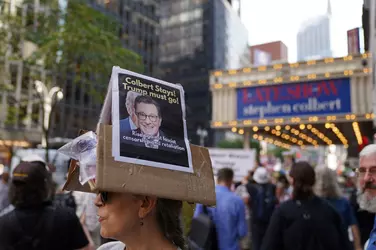 People protest after CBS announced the cancellation of Stephen Colbert's “Late Show” outside the Ed Sullivan Theater in New York on Monday. (Ryan Murphy/Reuters)
People protest after CBS announced the cancellation of Stephen Colbert's “Late Show” outside the Ed Sullivan Theater in New York on Monday. (Ryan Murphy/Reuters)
When Calvin Coolidge died, Dorothy Parker is said to have remarked, “How can they tell?” I felt the same way when
CBS announced it was canceling Stephen Colbert’s “Late Show.” At some point, I probably registered that Colbert had taken over the network’s late-night franchise, but if I did, I quickly forgot it. I never watched the show, because I literally can’t recall the last time I watched network television, outside of presidential debates.
In a
survey last year by Statista, only 59 percent of Americans said they had watched “linear television” (read: broadcast, cable or satellite shows) in the past 12 months, down from 79 percent five years ago. That reality is visible in Colbert’s ratings,
which declined from 3.1 million viewers in the 2017-2018 season, to 1.9 million last year, with
only a couple hundred thousand viewers in the critical 18-49 segment that advertisers covet. Advertising dollars similarly fell by about 40 percent, driving the show to a reported $40 million loss.
That, and not Colbert’s politics, is the primary thing you should be thinking about when you ask why the show was canceled. The great unbundling of the old networks and cable packages meant that late-night shows were no longer a hot media property but an economic liability.
Yes, Paramount, which owns CBS, wants to
consummate a merger with Skydance for which it needs the Trump administration’s blessing. And yes, Colbert’s highly visible ideology probably alienated viewers looking for some light entertainment, not a heavy dose of left-wing politics. Arguably, the political inflection made the show less funny, since humor depends on surprise, and Democratic politics long ago became pretty predictable.
But it would have been much harder to cancel a show that was making the network lots of money — or at least generating prestige and buzz. By the time CBS pulled the plug, late-night shows were no longer even doing that. They survived well into the cord-cutting era by generating viral clips on social media, which maintained their position as a cultural hub and encouraged viewers to watch in hopes of catching the next viral moment in real time. But sometime during the pandemic, that cultural centrality started to erode. These days, when someone pulls out their phone to show me a clip from one of the shows, it is likely to be one that aired years ago.
And that is why you should be concerned about what Colbert’s cancellation means for American democracy — not because it’s a sign of a corporation bending the knee to a would-be dictator, but because it’s a sign of the unbundling of the American public. Ensconced in our homes, watching our custom-tailored streaming feeds, we simply have fewer and fewer things in common.
That’s visible even when we leave the house, where about the only national experiences we seem to have in common are Starbucks and Target. The pews of major religious denominations are sparse, the lodges and service organizations and Veterans of Foreign Wars halls are closing,
libraries are morphing into
social service providers and scouting is in
managed decline. Meanwhile, the institutions we still have in common, such as public schools, have been riven by a divisive form of politics that often makes them feel like battlegrounds, rather than a shared national project. And America needs a shared national story, a common understanding of
something, to hold together as a nation.
But it’s hard to find that project when increasingly we’re not even leaving the house. Between 2003 and 2022, time spent at home rose by
1 hour 39 minutes a day. That’s a long-term trend, not just the result of the pandemic or the remote work revolution; we’re
socializing less and
spending more time alone, especially young people. And a lot of what we are doing is consuming bespoke content, curated for us by a personal algorithm.
In some ways, the Colbert show was a symptom of that shift. The sharp leftward lurch that consumed American media companies was driven by social media algorithms that rewarded left-wing political hot takes with high engagement. Media companies followed those rewards precisely because they were no longer catering to a truly mass audience but to niche fandoms. Having come of age in the long shadow of truly mass media, many of the people in those institutions might have thought they were moving public opinion into the progressive future, but in fact it was fan service for a narrow demographic.
Now the algorithms have changed and so have young people, who rarely turn on their televisions today. There’s no future in late-night TV, for the network, or for America. CBS could have cut some costs and ridden the show’s aging demographic into the sunset for a while longer. But it was obvious where things were headed, and it’s not surprising that when the journey got bumpy, the network decided the ride was over.
But if it’s not exactly a shock — it’s still incredibly sad to lose a show that was a cultural touchstone for decades. A mite dangerous, too, given that it looks as though CBS was appeasing a president the show often opposed (even if that’s not the case). But what’s most worrying is that we have no obvious successor to the unifying force that late-night shows used to be. America might no longer want the “Late Show.” But it needs
some way to hear the same stories, laugh at the same jokes and gather around the collective water cooler to talk about what they mean.

